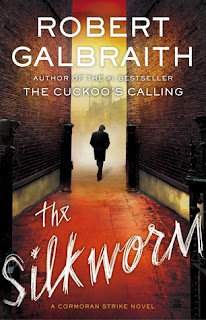The Silkworm
I liked J.K. Rowling's (writing as Robert Galbraith) debut mystery novel The Cuckoo's Calling enough to read the second, The Silkworm. In some ways, this is the perfect literary mystery, as it is set in the world of book publishing, a place Rowling must certainly know about. It's full of narcissists and egomaniacs, and that sounds pretty authentic.
She's back with her series detective, Cormoran Strike, a large man with one leg, and his eager assistant, Robin. Strike, with a lot of business after solving the case in the first book, has been hired by the wife of a writer, who has taken a powder. The writer is very eccentric, and his latest manuscript, a grotesquerie vilifying many people in his life, has angered many. A bit later Strike will find the writer dead, horribly mutilated in a manner from the man's book.
There are all different types of mysteries, and Rowling has written the kind is based on character, much like Elizabeth George's, in that the series regulars are meant to develop over the span of several books. This manages to be both interesting and annoying at the same time, as we can see where the books might head in the future (a hint of a relationship between Strike and Robin is in the last paragraph of the book), but it also makes the book extremely long and sometimes overshadows the mystery itself (I had to give up on George's books--they were way too long).
As for the mystery itself, Rowling uses the time-honored limited suspects (the only person who could have killed the victim had to have read the manuscript, and that is only a few people) and the solution is laid out in an old-style format, as Strike tells the killer how he figured it out. There's a kind of wink-wink in all this, as Rowling surely knows that this only happens in detective novels, but that's why we read them.
As I read, though, I remembered some of Elmore Leonard's rules of writing. I don't think he would have cared much for this book, as it spends a lot of time going on about weather (the story is set in winter, and while I didn't think England got much snow, it sure does here). The book also pays attention to Strike's finances, which is novel. He's forever bemoaning having to take cabs.
As mentioned in the review of her first book, Rowling takes writing with a male pseudonym seriously. In the first novel Strike beds a supermodel. In this book he uses a young woman for information (and for casual sex), the writer's wife is caricatured as a housefrau, and his agent is painted as a sexless gargoyle. Rowling is really tapping into the male inside her.
One line of the book got to me, when a publisher says, "More readers, fewer writers." I will take that advice to heart.
She's back with her series detective, Cormoran Strike, a large man with one leg, and his eager assistant, Robin. Strike, with a lot of business after solving the case in the first book, has been hired by the wife of a writer, who has taken a powder. The writer is very eccentric, and his latest manuscript, a grotesquerie vilifying many people in his life, has angered many. A bit later Strike will find the writer dead, horribly mutilated in a manner from the man's book.
There are all different types of mysteries, and Rowling has written the kind is based on character, much like Elizabeth George's, in that the series regulars are meant to develop over the span of several books. This manages to be both interesting and annoying at the same time, as we can see where the books might head in the future (a hint of a relationship between Strike and Robin is in the last paragraph of the book), but it also makes the book extremely long and sometimes overshadows the mystery itself (I had to give up on George's books--they were way too long).
As for the mystery itself, Rowling uses the time-honored limited suspects (the only person who could have killed the victim had to have read the manuscript, and that is only a few people) and the solution is laid out in an old-style format, as Strike tells the killer how he figured it out. There's a kind of wink-wink in all this, as Rowling surely knows that this only happens in detective novels, but that's why we read them.
As I read, though, I remembered some of Elmore Leonard's rules of writing. I don't think he would have cared much for this book, as it spends a lot of time going on about weather (the story is set in winter, and while I didn't think England got much snow, it sure does here). The book also pays attention to Strike's finances, which is novel. He's forever bemoaning having to take cabs.
As mentioned in the review of her first book, Rowling takes writing with a male pseudonym seriously. In the first novel Strike beds a supermodel. In this book he uses a young woman for information (and for casual sex), the writer's wife is caricatured as a housefrau, and his agent is painted as a sexless gargoyle. Rowling is really tapping into the male inside her.
One line of the book got to me, when a publisher says, "More readers, fewer writers." I will take that advice to heart.



Comments
Post a Comment